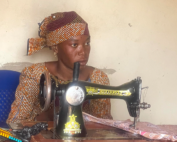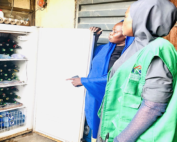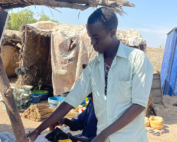With The Sense Project, Teachers Have More To Celebrate In Adamawa And Gombe State
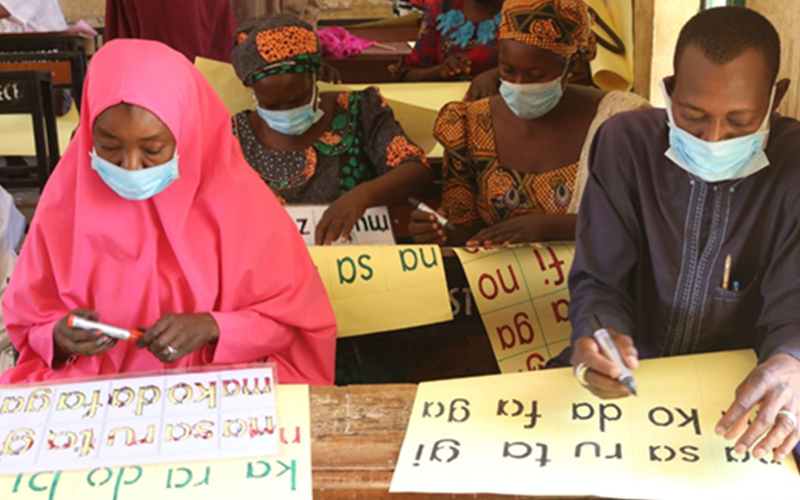
Only 40.5 % of people older than 6 are literate in Adamawa, northeast Nigeria1. The region’s children are at significant risk of being left behind. Low literacy rates also pose a significant risk to the quality of life of children and families already bearing the impact of poverty, insecurity, and the Boko haram insurgency. Women in Adamawa have an average of 5 children. With a population of over four million, the government is hard-pressed to provide essential services.
That is why the Strengthening Education in Northeast Nigeria States (SENSE) project, with funding from the United States Agency for International Development (USAID), has been working to make sure children in primary 1, 2, and 3(early grade learners) have a better chance in life. SENSE targeted three hundred and thirty-five public schools in need in Adamawa and Gombe state. One of the strategies to improve the reading outcomes of learners, apart from the provision of TLMs, is the building of capacity and skills of the teachers in SENSE target schools to teach reading using the Mukaranta reading program. The capacity and classroom practice of over 5,000 teachers have been built to teach reading. Results from classroom observation by the School Support Officers and the SENSE teacher support officers have been used to quarterly improve the skills of the teachers during boot camp and site visits to schools. The establishment of the TRCs also gave teachers a space to make interactive teaching and learning materials.
Parents, teachers, and the government are amazed by how fluent pupils in the early grade class now read in the Hausa language.
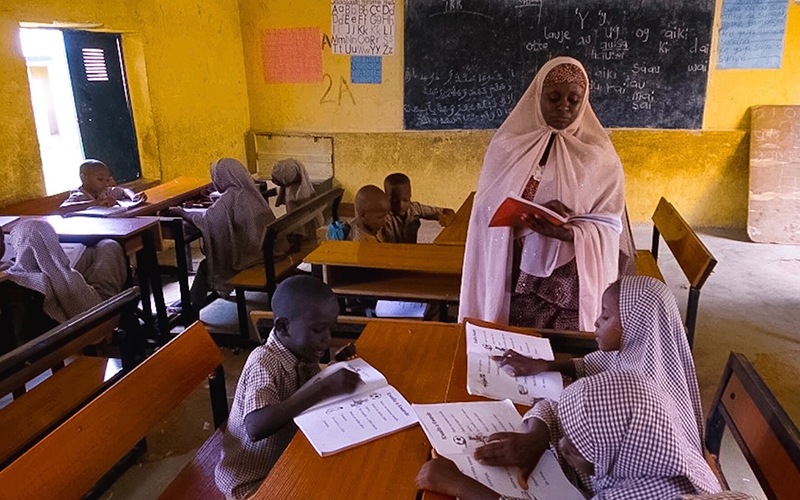 Representing the community last quarter, the Mubi South LGA SBMC chairman visited AUN with full praise for the project. “I have seen what this project has done for Mubi South; you have impacted the knowledge that our children will never forget, even to the end of the world. I have gone around the schools with my team, and we have seen what you have done in Mubi South. Many organizations have come to Mubi South to implement programs, but you have done what Mubi South will never forget. I want you to extend our appreciation to our donor, USAID, who have decided to bring this intervention to Adamawa state and extend it to Mubi South”. The Chairman said. The SBMC chairman was accompanied by the Head of Quality Assurance, Mubi-South, the Education Secretary represented by the Head of Social Mobilization, the Coordinating School Support Officer, and the Mubi South Desk officer. According to the Mubi South Desk officer, The Mubi South SBMC visited all twenty schools where SENSE is intervening and was so impressed by the children’s performance in primary 1, 2, and 3 in reading. He felt the donor should be appreciated. “Many NGOs have intervened in Mubi South, but the project that has a genuine impact is the SENSE project.” Said the Mubi South Desk officer.
Representing the community last quarter, the Mubi South LGA SBMC chairman visited AUN with full praise for the project. “I have seen what this project has done for Mubi South; you have impacted the knowledge that our children will never forget, even to the end of the world. I have gone around the schools with my team, and we have seen what you have done in Mubi South. Many organizations have come to Mubi South to implement programs, but you have done what Mubi South will never forget. I want you to extend our appreciation to our donor, USAID, who have decided to bring this intervention to Adamawa state and extend it to Mubi South”. The Chairman said. The SBMC chairman was accompanied by the Head of Quality Assurance, Mubi-South, the Education Secretary represented by the Head of Social Mobilization, the Coordinating School Support Officer, and the Mubi South Desk officer. According to the Mubi South Desk officer, The Mubi South SBMC visited all twenty schools where SENSE is intervening and was so impressed by the children’s performance in primary 1, 2, and 3 in reading. He felt the donor should be appreciated. “Many NGOs have intervened in Mubi South, but the project that has a genuine impact is the SENSE project.” Said the Mubi South Desk officer.
Appreciation like this has become routine. According to the Permanent Secretary from the Ministry of Education, I was shocked to see how fluently these children were reading during the steering committee meeting. This program needs to be sustained.
Below are some of the statements teachers have made several times to different people from various sectors on their improvement since SENSE Activity trained and provided continuous support to them through constant supportive supervision provided by SSOs and SENSE teacher support officers.
Ruqqyatu Babagari, a P2 teacher at Zaibadari Primary School, said, “SENSE USAID training has helped us, especially in teaching young children to read. Even though I read education, I lacked the methods to impart knowledge. Thanks to SENSE, my skills have improved.”
“Also, the Head Teacher of Central Primary School, Jimeta Auwal Saad, has this to say: we greatly appreciate SENSE for training our teachers. Before the SENSE project, our pupils could not read in Hausa, but now they can read so much that they try translating it into English. SENSE trained our teachers. That’s why I say SENSE makes sense,” said Mr. Saad. “With SENSE, our teachers have learned so much from workshops. They are now motivated to teach. I hope the SENSE program continues. I hope they continue to train our teachers because they are the best so far.”
Rita Jockthan – Headteacher Numan 3 primary school Numan: “There have been great achievements and improvements in the students’ and teachers’ performance based on the training provided by the SENSE program. The children can read and identify the alphabet in Hausa very fast. P1 can now identify all alphabets”. Thanks to SENSE
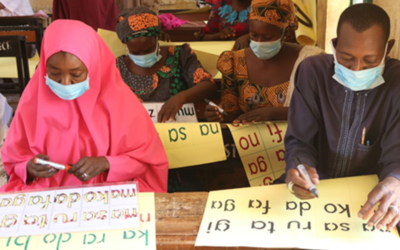 Mohammed Aliyu – Head Teacher, Central Primary School, Hong, The SENSE-RANA teachers have improved in every angle, especially in making teaching aids and teaching performance. There is nothing more from our school because we are good to go. Our only fear is after the program, we might still need the help of the SENSE. Therefore, we are soliciting your help even after the program to keep the work going”.
Mohammed Aliyu – Head Teacher, Central Primary School, Hong, The SENSE-RANA teachers have improved in every angle, especially in making teaching aids and teaching performance. There is nothing more from our school because we are good to go. Our only fear is after the program, we might still need the help of the SENSE. Therefore, we are soliciting your help even after the program to keep the work going”.
Babadiya from Numan 2 Primary School:” Before the coming of the SENSE project, our pupils didn’t know how to read, but with the method of teaching that the SENSE project taught us, it is now easier for our children to read. Before the SENSE project, our children were usually shy; they didn’t have the confidence to participate in any class activity, but now they are eager to participate in class activities. I gained from the SEL training SENSE project organized. Before, we teachers did not know how to teach children to read, but the scripted lesson and methodology SENSE taught us have helped us. Teaching engages us as teachers, and the learners are happy to attend school.
Hajiya Aisha from Central Primary School, Numan: “Before the SENSE project, we did not know how to teach reading, and we did not even teach Hausa sounds, and this made it difficult for our children to read, but with these new methods from SENSE project, it is easy for us to teach and our children are reading fasting excellent us teachers. Before SENSE training on SEL, I did not know how to relate with my pupils, but after the SEL training, my children are always happy and sing for me when they see me coming.
The head teacher of Karewa Primary School, Jimeta, has this to say:” The TLMs provided to all the P1, P2, and P3 pupils have really helped us. Before, we did not know anything about instructional materials, and SNSE even gave us TRC; this has helped to improve teachers’ capacity in the classroom”.
The impact of SENSE on teachers in Adamawa and Gombe states is so enormous that the key education stakeholders are advising other NGOs to learn from the SENSE approach.
